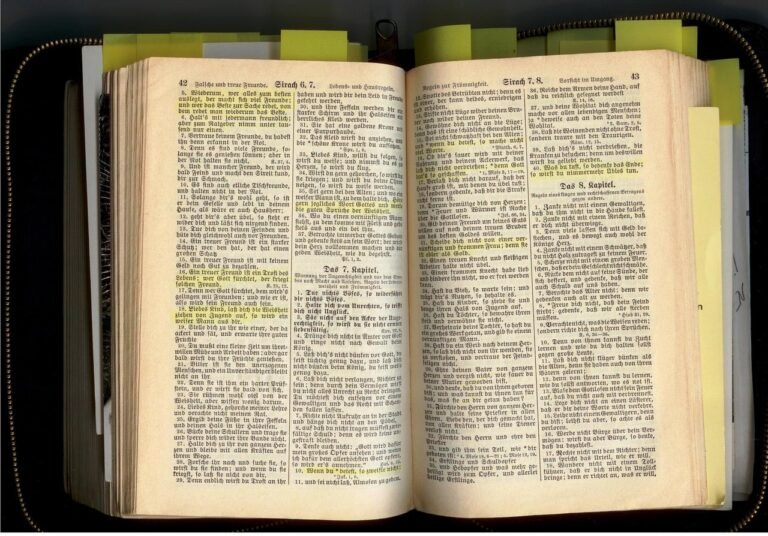What Does The Bible Say About Budgeting?
Curious about “what does the Bible say about budgeting?” In this article, we take a Catholic lens to this intriguing question, diving deep into scriptural teachings that offer financial guidance. Through a conversational exploration, we’ll uncover the Bible’s rich wisdom and practical advice on this vital aspect of life. If you’ve been seeking to harmonize your budgeting methods with your faith, then you’re in the right place. Join us as we unveil biblical insights on managing finances.
Stewardship
As a believer, you understand that everything you have belongs to God. He is the ultimate owner of all resources, and we are called to be good stewards of what He has entrusted to us. Stewardship is the recognition that we are merely caretakers of the blessings God has bestowed upon us. It involves managing our time, talents, and treasures in a way that aligns with God’s will and purposes. By acknowledging God’s ownership, we shift our mindset from one of entitlement to one of responsibility.
Acknowledging God’s Provision
When we recognize that God is the provider of all things, it changes our perspective on budgeting. We start to view our finances as a gift from God rather than something solely under our control. This acknowledgment brings humility and gratitude into our financial planning. Instead of relying solely on our own abilities, we trust in God’s provision and seek His guidance in making wise financial decisions.
Planning and Saving
Proverbs on Planning
The book of Proverbs offers valuable insights into the importance of planning. Proverbs 21:5 states, “The plans of the diligent lead surely to abundance, but everyone who is hasty comes only to poverty.” This verse emphasizes the need for intentional and thoughtful planning. By setting financial goals, creating budgets, and establishing a roadmap for our finances, we can work towards abundance rather than hasty decisions that lead to poverty.

The Ant’s Example
Proverbs 6:6-8 urges us to consider the example of the ant when it comes to planning and saving. Ants are diligent workers who gather and store food during the summer in preparation for the winter. Similarly, we are encouraged to plan and save for the future to avoid financial hardships. By adopting the ant’s mentality of diligence and foresight, we can ensure that we have enough resources to meet our needs and also bless others.
Preparing for the Future
In Matthew 25:14-30, Jesus tells the parable of the talents, illustrating the importance of stewarding our resources wisely. The story highlights the faithfulness of those who invested their talents and multiplied them. It reminds us to think long-term and prepare for the future. This involves saving for emergencies, retirement, and also setting aside funds for unexpected expenses. By planning and saving, we can navigate financial challenges with peace and stability.
Avoiding Debt
Debt as a Form of Slavery
Proverbs 22:7 states, “The rich rules over the poor, and the borrower is the slave of the lender.” This verse warns us about the enslaving nature of debt. When we accumulate debt, we become beholden to the lender, sacrificing our financial freedom and limiting our options. Avoiding debt should be a priority in our financial planning, as it preserves our ability to make decisions based on God’s leading rather than the constraints imposed by debt obligations.

Proverbs on Borrowing
While there are certain situations where borrowing may be necessary, the book of Proverbs cautions against it. Proverbs 22:26-27 advises, “Do not be one of those who give pledges, who put up security for debts. If you have nothing with which to pay, why should your bed be taken from under you?” This verse reminds us to exercise caution when it comes to borrowing and to carefully consider the potential consequences before entering into any financial commitments.
Being Content with What You Have
Contentment plays a crucial role in avoiding debt. Hebrews 13:5 encourages us to be content with what we have, reminding us that God will never leave us nor forsake us. When we prioritize contentment over material possessions, we are less likely to be tempted into debt for the sake of acquiring more. Contentment allows us to focus on stewarding our resources well and finding joy in the provisions that God has already blessed us with.
Giving and Generosity
Tithing and Offerings
In Malachi 3:10, God challenges His people to test Him in the area of giving by bringing the full tithe into the storehouse. Tithing, which involves giving ten percent of our income, is an act of obedience and a way to honor God with our finances. In addition to tithing, the Bible also encourages us to give offerings, which are voluntary contributions beyond the tithe. As we give generously and cheerfully, we position ourselves to receive God’s blessings and become channels of His love in meeting the needs of others.

Generosity of Heart
2 Corinthians 9:7 reminds us that “God loves a cheerful giver.” Our generosity should flow from a genuine desire to bless others and reflect the heart of God. As we cultivate a spirit of generosity, we exemplify Christ’s love to the world and fulfill the command to love our neighbor as ourselves. Generosity not only impacts the lives of those we assist but also transforms our own hearts, allowing us to experience the joy that comes from giving and sowing into God’s kingdom.
Helping the Needy
One of the core principles of biblical budgeting is to allocate funds to help the needy. Proverbs 19:17 states, “Whoever is generous to the poor lends to the Lord, and he will repay him for his deed.” Giving to the less fortunate demonstrates compassion and reflects the heart of God. By including provisions for helping the needy in our budget, we create opportunities to be part of God’s work in relieving suffering and meeting the physical and spiritual needs of others.
Honesty and Fairness
Avoiding Dishonest Gain
Proverbs 28:6 warns against pursuing wealth through dishonest means: “Better is a poor man who walks in his integrity than a rich man who is crooked in his ways.” As believers, we are called to walk in honesty and integrity in all aspects of life, including our finances. This principle should guide our decisions and interactions, ensuring that we do not compromise our values for the sake of personal gain.

Just Weights and Measures
Proverbs 11:1 states, “A false balance is an abomination to the Lord, but a just weight is his delight.” This verse emphasizes the importance of fairness and honesty in our financial dealings. Whether it’s in business transactions, pricing, or financial agreements, we should strive for integrity and fairness, aligning our actions with God’s standards.
Dealing with Others in Integrity
In Romans 12:17, the apostle Paul exhorts believers to “be honest in the sight of all.” Honesty and integrity should be the foundation of our financial interactions with others. This includes fulfilling financial commitments, honoring agreements, and being transparent in our dealings. By conducting ourselves with integrity, we build trust and demonstrate the character of Christ in all areas of life.
Prioritizing Needs
Seeking First the Kingdom of God
Matthew 6:33 instructs us to “seek first the kingdom of God and his righteousness, and all these things will be added to you.” This verse reminds us of the importance of prioritizing our spiritual needs above material possessions. When we seek God’s kingdom first, our financial decisions are guided by His wisdom and purposes. By aligning our priorities with God’s, we can rest assured that He will provide for our needs.

Contentment and Material Possessions
1 Timothy 6:6 states, “But godliness with contentment is great gain.” True wealth consists not in the accumulation of material possessions but in the contentment found in godliness. When we prioritize contentment over material gain, our desires become aligned with God’s will, and we are liberated from the constant pursuit of worldly possessions. Contentment allows us to be satisfied with what God has already provided and frees us from financial burdens driven by discontentment.
Recognizing True Value
Jesus reminds us in Matthew 16:26, “For what will it profit a man if he gains the whole world and forfeits his soul?” This verse underscores the importance of recognizing the true value of our possessions and priorities. While financial stability is necessary, it should never take precedence over our relationship with God and our eternal destiny. By acknowledging the temporary nature of material wealth, we can focus on investing in what truly matters—our faith and the souls of others.
Seeking Wisdom
Proverbs on Wisdom
The book of Proverbs is a treasure trove of wisdom, offering practical guidance for various areas of life, including finances. Proverbs 2:6-7 reminds us that wisdom comes from God: “For the Lord gives wisdom; from his mouth come knowledge and understanding…He stores up sound wisdom for the upright.” Seeking wisdom from God is integral to making wise financial decisions, and the book of Proverbs serves as a valuable resource for gaining insight into godly financial management.
Seeking God’s Guidance
James 1:5 encourages us to seek wisdom from God: “If any of you lacks wisdom, let him ask God, who gives generously to all without reproach, and it will be given him.” When it comes to budgeting and financial planning, we should seek God’s guidance through prayer and studying His Word. By inviting God into our financial decisions, we open ourselves up to His wisdom and direction, enabling us to make choices that align with His will.
Making Wise Financial Decisions
Wisdom is not just theoretical knowledge; it also involves applying that knowledge correctly. Proverbs 3:9-10 advises us to honor God with our wealth and trust in Him for provision: “Honor the Lord with your wealth and with the firstfruits of all your produce; then your barns will be filled with plenty, and your vats will be bursting with wine.” Making wise financial decisions involves aligning our actions with biblical principles and relying on God’s wisdom instead of our own understanding.
Work Ethic
Proverbs on Diligence
Proverbs consistently emphasizes the value of diligence and a strong work ethic. Proverbs 10:4 states, “A slack hand causes poverty, but the hand of the diligent makes rich.” Diligence involves giving our best effort in whatever work we do, whether it’s our job, household chores, or serving in ministry. By working diligently, we honor God and position ourselves for financial abundance.
The Value of Hard Work
In Colossians 3:23, the apostle Paul reminds us, “Whatever you do, work heartily, as for the Lord and not for men.” When we approach our work with excellence and a diligent spirit, we reflect the character of Christ. Our work ethic not only impacts our financial well-being but also influences those around us, providing a testimony of our faith and commitment to serving God through our labors.
Laziness and Poverty
Proverbs 24:30-34 paints a vivid picture of the consequences of laziness and lack of work ethic: “I passed by the field of a sluggard, by the vineyard of a man lacking sense…a little sleep, a little slumber, a little folding of the hands to rest, and poverty will come upon you like a robber.” Laziness leads to missed opportunities, financial struggles, and a lifestyle of poverty. By contrast, embracing a diligent work ethic positions us for success and financial stability.
Contentment vs. Covetousness
Guarding Against Greed
Luke 12:15 cautions against the dangers of greed: “Take care, and be on your guard against all covetousness, for one’s life does not consist in the abundance of his possessions.” Greed is an insidious trap that can lead us away from contentment and put undue focus on material gain. By guarding our hearts against greed, we can cultivate a spirit of contentment and find fulfillment in our relationship with God.
Finding Contentment in God
Hebrews 13:5 reminds us to be content with what we have: “Keep your life free from love of money, and be content with what you have, for he has said, ‘I will never leave you nor forsake you.'” Our contentment should be rooted in our confidence in God’s provision and faithfulness, rather than in our financial circumstances. By finding contentment in God, we escape the endless pursuit of worldly possessions and allow Him to satisfy the deepest longings of our hearts.
The Dangers of Covetousness
The Tenth Commandment, found in Exodus 20:17, warns against covetousness: “You shall not covet your neighbor’s house; you shall not covet your neighbor’s wife, or his male servant, or his female servant, or his ox, or his donkey, or anything that is your neighbor’s.” Covetousness breeds discontentment and can lead to a host of other sins, including theft and envy. By guarding our hearts against covetousness, we protect our finances from decisions driven by selfish ambition and gain peace in our relationship with God.
Seeking Financial Freedom
Good Stewardship and Financial Freedom
By practicing good stewardship, we position ourselves for financial freedom. Proverbs 11:24-25 teaches, “One gives freely, yet grows all the richer; another withholds what he should give, and only suffers want. Whoever brings blessing will be enriched, and one who waters will himself be watered.” This verse highlights the principle that generosity and responsible financial management go hand in hand. By faithfully stewarding our resources and giving generously, we not only bless others but also experience the freedom that comes from trusting God with our finances.
Putting Money in its Proper Place
1 Timothy 6:10 warns, “For the love of money is a root of all kinds of evils. It is through this craving that some have wandered away from the faith and pierced themselves with many pangs.” Money should never hold the position of our ultimate source of security and satisfaction. By putting money in its proper place, as a tool to honor God and bless others, we release its hold on our lives and open ourselves up to experience true freedom and joy in Christ.
Trusting God’s Provision
Finally, seeking financial freedom involves trusting in God’s provision. Philippians 4:19 assures us, “And my God will supply every need of yours according to his riches in glory in Christ Jesus.” As we prioritize God’s kingdom and align our financial decisions with His will, we can have confidence that He will meet our needs. Trusting in God’s provision allows us to let go of anxiety and worry, knowing that we serve a faithful God who cares for every aspect of our lives.
In conclusion, the Bible offers profound wisdom and guidance when it comes to budgeting and financial management. By acknowledging God’s ownership, planning and saving, avoiding debt, giving generously, practicing honesty and fairness, prioritizing our needs, seeking wisdom, cultivating a strong work ethic, and guarding against covetousness, we can experience financial freedom and live as faithful stewards of God’s blessings. May we apply these principles in our lives and honor God with our finances, recognizing that true wealth lies in our relationship with Him rather than the accumulation of material possessions.






